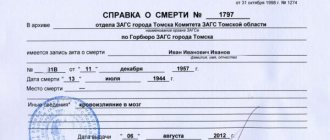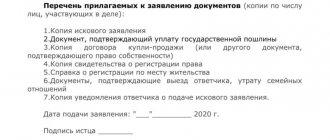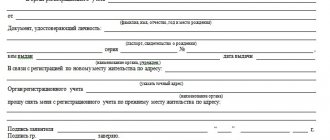Law on ejection from an apartment without consent
The discharge of citizens from privatized housing is regulated by Decree of the Government of the Russian Federation No. 713 of July 7, 1995 (as amended on May 25, 2017). The document lists all the legal grounds for forcibly expelling a person from an apartment and the necessary procedure for this.
What does the law say about forced deportation?
To identify all the features of the procedure, it is worth referring to the current regulations.
The procedure for registration and cancellation of registration is regulated by the following laws:
- Article No. 31 of the Housing Code of the Russian Federation;
- Article No. 83 of the Housing Code of the Russian Federation;
- Article No. 292 of the Civil Code of the Russian Federation;
- Article No. 154 of the Code of Civil Procedure of the Russian Federation;
- Article Federal Law No. 5242-1.
It would also be a good idea to familiarize yourself with the registration rules. It is necessary to study the latest edition of the documents.
What rights does the owner have?
In accordance with paragraph 1 of Art. 209 of the Civil Code of the Russian Federation (hereinafter referred to as the Civil Code of the Russian Federation), the right of ownership is multi-component. It includes the right of possession, use and disposal. This also applies to the right of ownership of an apartment (Article 288 of the Civil Code of the Russian Federation).
The owner can not only live in the apartment, but also decide with whom he wants to share the roof over his head.
Family members of the owner of the premises have a special privilege, who can demand elimination of the violation of their rights from everyone, including the owner himself. However, this is associated with obligations to pay for the premises, and failure to fulfill them is a direct basis for discharge through the court.
In addition, the owner can remove people from an apartment without their consent in other cases:
- breakdown of family relationships;
- living in another place;
- the resident's behavior deviates from the norm.
Common to all situations is the judicial procedure for deregistration at the initiative of the owner.
Statement of claim
To begin the forced deportation procedure, you need to send a statement of claim to the court. A sample claim can be downloaded here.
The text of the application must include:
- details of the plaintiff and defendant (full name, address, contacts);
- reasons for going to court with reference to evidence, violated regulations;
- the plaintiff's demands to deregister the apartment, and if necessary, to forcefully evict the tenant.
A list of all documents attached to the application must be included in the text of the application. The claim is always submitted in writing and signed personally by the submitter.
Interesting article: How to discharge a deceased person from an apartment?
Documentation
The procedure will require a lot of documents. Conventionally, they can be divided into documents for the court and papers for submission to the Main Directorate for Migration of the Ministry of Internal Affairs of the Russian Federation, where deregistration will take place.
For the trial you will need:
- statement of claim;
- an extract from the Unified State Register of Real Estate confirming the ownership of housing, or a social tenancy agreement;
- a copy of the plaintiff's passport;
- certificate of persons registered in the apartment (issued at the Main Directorate for Migration of the Ministry of Internal Affairs of the Russian Federation);
- receipt of payment of state duty.
What can serve as evidence in the case:
- divorce certificate (if ex-spouse is being evicted);
- returned postal envelopes confirming that the tenant does not live at the specified address;
- photo/video indicating an antisocial lifestyle;
- a statement to the police about rowdy behavior in the apartment;
- protocols on administrative violations, acts on illegal redevelopment and other evidence of violations;
- proof that the person being evicted has another home;
- witness statements;
- unpaid utility bills.
Evidence is attached to the claim in the form of copies. It is better to take the originals to the court hearing, in case the court requires them.
For subsequent discharge to the Main Migration Department of the Ministry of Internal Affairs you will need:
- court decision on eviction and deregistration;
- application in form No. 6 for deregistration (sample can be downloaded here);
- plaintiff's passport;
- confirmation of ownership of the apartment or residence in it (social tenancy agreement, etc.).
State duty
The amount of state duty when filing a claim is 300 rubles. You can pay it at any bank using the details that are taken from the court office. The procedure for deregistration with the Ministry of Internal Affairs is free of charge.
Deadlines
The processing time for a claim is on average 2 to 3 months, depending on the complexity of the case and the availability of all the necessary evidence. Any court decision can be appealed within a month. The discharge itself takes no more than 3-8 days.
How to discharge a tenant without his consent?
As we mentioned above, if the unwanted tenant is a tenant, the owner can only discharge the citizen by court decision. To do this, he must first make an appropriate appeal to the main owner, that is, in our case, to the municipality. And only after a certain series of actions in relation to the tenant who does not want to be checked out can you go to court.
But it is impossible to remove the owner from his own home! His state registration can be canceled only after he has lost ownership of the property by transferring it to another person.
In addition, lawyers note that it is almost impossible to evict minor children from their homes. To discharge children who have not yet turned 18 years of age, it is necessary to obtain permission from the guardianship authorities, who have the right to refuse the application if the financial situation of the child worsens as a result.
Thus, children who own a share of real estate or act as its owner cannot be legally deregistered without their consent.
Legal grounds for expelling a registered person from the apartment
In order to evict a person from an apartment, if he is registered in it, the owner must have valid reasons regulated by the codes of Russia.
The most common cases include:
- Divorce proceedings are a reason for dissolving family and housing relationships. A simple situation is the full ownership of the property by one of the parties, i.e. the property was acquired or received as a gift before the conclusion of the union. In this context, this means voluntary discharge or after going to court.
- Refusal or ignorance of the need to pay for housing and communal services for the apartment, including capital contributions and current maintenance of the apartment building. The tenant is evicted based on monetary interests. The highest authority will not interfere with such a decision.
- The person leads an antisocial lifestyle - he constantly makes loud noise at inappropriate times, is rowdy and neglects common property. The forced eviction of a citizen will be satisfied if there is testimony from witnesses and protocols from the local police officer.
- Long-term non-residence in an apartment. Accordingly, there are no mandatory payments for utility services. In addition, the owner has information about the citizen’s residence in another place.
How to be discharged from a municipal apartment
Municipal housing is non-privatized, that is, state-owned housing. The state has the right to actually dispose of it, and therefore it will be possible to discharge a tenant from a municipal apartment without his consent only through the courts.
All the grounds on which the owner can demand the discharge of a tenant are listed in Article 83 of the Housing Code of Russia. Here is who can be forcibly evicted from a municipal apartment according to the law:
- violators of community norms (hooligans, rowdies);
- citizens who have lost parental rights, and with them the right to live with the child;
- those who do not comply with sanitary standards, disturb the peace of neighbors , and pose a social danger;
- a citizen who has not lived at his place of registration for a long time;
- people who engage in illegal redevelopment, endanger the building or worsen its condition: for example, destroy walls and partitions, destroy plumbing, gas and other equipment, and damage the finish.
- persistent defaulters who have arrears on utility bills for a period of six months;
- citizens who use their living space for other purposes, that is, not as housing;
- citizens who live under a lease or social tenancy if the agreement has expired.
For reference. Before trial, the initiators of the case - family members, neighbors, guardians or other interested citizens - must contact local authorities. It is municipal officials who will draw up and submit the statement of claim.
If the court satisfies their request, then the initiator of the case will only have to draw up an application for forced deportation (the form can be found on the Internet) and, together with the court decision, take it to the district department of the Federal Migration Service.
How to discharge from a privatized apartment
Privatized housing is housing that does not belong to the state and is the private property of a citizen. As an owner, the owner of a privatized apartment has the right to eject a non-owner from there without his consent.
However, we must not forget about property rights. For example, if a woman wants to write out her ex-husband, but the former spouses once purchased the housing itself under a mortgage agreement, then the matter will become more complicated. The unpaid mortgage debt is considered a common obligation of the former spouses, and they will also have common rights to housing.
To remove a tenant from registration, you must be the full owner of the property and have an extract from the Unified State Register of Real Estate or other papers that confirm ownership: deed of gift, purchase and sale agreement, certificate of inheritance or privatization. You will also need to legally sever family ties with the evicted person and obtain a certificate of divorce.
According to Article 292 of the Civil Code of the Russian Federation, family members of the owner have the right to live with him. However, if the residential premises were privatized after marriage, then it will be considered jointly acquired property, and the evicted person will be able to claim a share.
Here is a general list of cases when a tenant can be discharged from an apartment without his consent:
- Severance of family ties (divorce), except in cases like those mentioned above.
- Long absence from the place of registration. Since eviction from a privatized apartment also usually takes place in court, the owner, after filing a lawsuit, will have to prove that the person does not live in his apartment.
- Acquiring housing as a result of purchase or inheritance. In this case, the applicant is not required to report to the court the reasons for his decision. He only needs to report that the residents refuse to leave the living space voluntarily after the housing is transferred to the new owner.
- Disturbance of public peace. In addition to the owner, the initiators of forced deportation in this case are often neighbors.
- Use of housing for purposes other than its intended purpose.
- Illegal redevelopment, destruction of load-bearing structures and deliberate deterioration of living conditions.
How to discharge a person from a donated apartment
The gift agreement unconditionally confirms the owner’s right to own the residential premises.
If one of the spouses received it as a gift, then it will not be considered jointly acquired property and in the event of a divorce it will go exclusively to the owner of the apartment. The full owner can expel a person from the apartment without his consent, if this does not contradict other laws. It happens that when donating, someone remains registered in the apartment. Then the new owner has the right to expel all residents from it in court if they refuse to leave voluntarily.
How to discharge citizens of various categories from an apartment
The issue of an extract is resolved for each category of citizens with their own characteristics. For example, how can you compare the discharge procedure for an adult and a child who is not yet able to even evaluate his own actions?
For this reason, before you start moving, you should understand your situation well and think through all your steps, down to the possible consequences.
Discharge of a former spouse without obtaining consent
If it was not possible to separate from your ex-spouse peacefully, in some cases you can try to discharge him through the court. When the apartment was purchased before marriage or for other reasons belongs only to the wife or husband, everything is clear. The second spouse will be evicted by court decision in accordance with Art. 31 of the Housing Code of the Russian Federation.
If the apartment is in common ownership, it will not be possible to evict the ex-spouse.
The situation is different with a municipal apartment - spouses have equal rights to live in it. In this case, you can part with your former life partner only if he/she violates the rules of residence: does not pay, behaves antisocially, and so on.
But what does it take to discharge such a roommate? Contact the owning authorities and report violations. They can begin legal proceedings to deregister.
Discharge of a person to nowhere
As a rule, the court pays attention to whether the person being discharged has another living space for registration. This is especially true for minors. As a general rule, they can be discharged from housing only upon subsequent registration in another place.
But sometimes not having another place to live doesn't matter. This happens when there is a change of ownership. The new owner has no relation to those who were registered by the previous one, so according to the law, people can be discharged to nowhere.
To understand whether the owner of the house can discharge a relative to nowhere, you need to reason based on the degree of relationship and circumstances. Most often, such an extract occurs on a general basis. But relatives cannot be expelled from an apartment in which they could have received ownership rights, but abandoned it during privatization.
Grounds for cancellation of registration
The conditions, however, as well as the grounds for the forced removal of a person from the living space he occupies directly depend on the form of the property. Thus, among the most common cases in our legal practice that apply to municipal property, it is worth highlighting the following:
- Tenant's debt on utility bills for six months.
- The citizen did not live in the living space he was renting for a long period of time.
- The unwanted tenant has another apartment where he lives most of the time.
- The resident uses the house or apartment in which the citizen is registered not for its intended purpose, but for purposes unrelated to residence.
- The person caused significant damage to the living space.
- The tenant grossly disturbs the peace of neighbors and citizens living with him, ignoring their rights.
- Expiration of the actual lease term or the agreement signed by the parties (social rent, sublease or rental).
- The dwelling is being prepared for demolition, as it was considered unsafe and dilapidated.
- Illegal registration of a citizen.
If an apartment, house or other housing is legally owned, then the following reasons are added to the above reasons:
- an official divorce was filed and the spouses changed their status to former spouses;
- those living in an apartment or house do not have a common household;
- citizens who live separately and do not pay the costs of maintaining their housing or do not take part in caring for it at all.
Where can an owner register a tenant?
The procedure for removing an unwanted tenant from an apartment without his consent is easier to understand if it is presented in the form of a short instruction or a step-by-step guide to action.
Don't have time to delve into legal nuances? Asking a lawyer is faster than reading ! Get a FREE online consultation from the best legal experts - right now !
EVERYONE NEEDS TO KNOW THIS:
What documents are needed to sell an apartment from the owner in 2020
So, both registration and its cancellation must be carried out by the FMS. Therefore, the owner should immediately contact the local branch of this organization. However, this applies only to those property owners who have clear grounds for deregistering a tenant without interference in the judicial process.
Also, be sure to look at our article, which tells you how to write a resignation letter of your own free will using a correctly completed sample!
Deprivation of registration of a non-owner without his consent in court
If in the past case everything was relatively clear, then in the case of going to court, the owner of the apartment will have to provide a package of necessary documents, which are worth talking about in more detail.
Although, according to the legislation of the Russian Federation, the owner has the right to make an independent decision on the eviction of tenants he dislikes, it is worth noting that in 90% of cases it is impossible to do without a court.
To carry out a forced discharge through the court, you first need to collect the following documents:
- statement of claim (it is worth clarifying that the court itself does not discharge citizens, but only terminates the use of housing);
- all important documents confirming ownership and a sample rental agreement;
- available receipts for payment of utility bills;
- any evidence (for example, written testimony from neighbors) about the antisocial behavior of the unwanted tenant;
- documents confirming that the tenant has another living space;
- certificate of citizens who are registered in the home;
- receipt of successful payment of the state fee.
Also, pay attention to the following details of the statement :
- You cannot discharge a tenant from an apartment to “nowhere.” That is, if he does not have another place to live, the owner is obliged to provide the evicted citizen with housing of similar conditions.
- All utility debts must be paid before the tenant is discharged. Otherwise, this responsibility falls on the owner himself.
- The issue of deregistering citizens without their consent is, as a rule, considered by the magistrate's court, and appeals against the claim of the property owner must be filed with higher government bodies.
- The court has five days to consider the claim, and the judge must make a decision on it within a period of 30 to 60 days.
- The fixed state duty in 2020 is 200 rubles. At the same time, it is worth considering that this amount remains the same only if the claim is filed against one defendant. If there is a claim against several citizens, the state duty is charged for each of them.
EVERYONE NEEDS TO KNOW THIS:
Sample receipt for receiving money for a sold apartment
Of course, it is quite difficult to calculate the exact cost, because it also needs to include notary services, as well as the cost of copying documents, the prices of which vary depending on the region of residence of the plaintiff.
After receiving approval from the court to cancel the registration, the discharged resident is given a so-called departure slip.
Reasons for discharge
A valid reason for expelling a non-owner from an apartment may be:
- divorce of spouses;
- using the space for other than its intended purpose, for example, as an office or retail outlet;
- non-compliance with mandatory safety rules (fire safety, sanitary and others);
- antisocial behavior of a long-term resident;
- expiration of a lease agreement or other agreement giving the right to register at the place of residence;
- change of owner of the apartment;
- recognition of the premises as unsafe and subject to demolition;
- recognition of registration as illegal.
Causes
To discharge a person from an apartment through the court, you will need to draw up an action plan in advance. It is necessary not only to collect the necessary documentation and have a basis, but also to clearly understand where to go and what to indicate in the text.
Reasons for discharge may be the following:
- The citizen is officially declared missing.
- Death of the registered non-owner.
- Loss of right of residence.
- The registration was carried out in violation of legal norms.
- Sometimes passport office employees register people where they are not supposed to do so. Such registration is considered fictitious.
- The person does not live in the living space and there is evidence that he has another place to live.
- If people were married and then divorced, then the former spouse is not considered a relative and the owner of the property has the right to write him out. A compulsory procedure is provided if a person voluntarily does not want to deregister.
- You can even deregister a relative who has not lost the corresponding status, if he was registered before the privatization of square meters.
- For regular non-payment of utilities.
- Gross violation of the rules for using the premises and immoral actions. The rowdy will be discharged due to inappropriate behavior, as well as a threat to the life and health of household members.
Note: you need to file a claim only if you have a good reason. If a person simply did not pay for utility services, then he can ask for a deferment from the housing and communal services and retain his registration.
When it is almost impossible to discharge for antisocial behavior
A popular reason for initiating removal from a municipal apartment is the tenant’s antisocial behavior. Of course, a similar question can be raised in relation to the owner of a private apartment, but here along the way you will encounter a number of difficulties with justification and proof.
A forced discharge in court for indecent behavior of a tenant who is not the owner of the property may be based on the following actions:
- excessive consumption of alcoholic beverages;
- scandals and screams, especially in the evening;
- constantly listening to loud music and so on.
At the same time, the behavior should cause complaints from other residents and neighbors. Evidence may include witness statements and police calls.
However, it is almost impossible to discharge the owner through the court under the same circumstances. As practice shows, his behavior is punishable only by administrative penalties.
How can an owner expel a registered person from an apartment through the court?
The discharge procedure will be the same in almost all cases. Let's take as a basis the fact that the tenant did not agree to voluntarily be discharged from the housing and it is impossible to forcefully discharge him without going to court. That is, the most common and relevant situation that occurs very often.
Procedure
- Invite the resident to check out voluntarily. This proposal must be made in writing and, preferably, the communication must be recorded via audio or video materials (on a camera or voice recorder). It is logical that most of the registered persons will refuse to leave the apartment/house, but this point will be important for the court. He will show that the owner tried to solve the problem out of court, but it didn’t work out through no fault of his own.
- Draw up a statement of claim (see sample below).
- Collect all necessary documents (see list below).
- Submit documents and application to the court.
- Pay the state fee.
- Wait for the court hearing and attend the hearing of the case. Formally, you don’t have to be present, however, as practice shows, most often cases in such a situation are not closed on the terms that suit the plaintiff.
- Get a court decision.
- Wait for the decision to take effect.
- Based on the court decision, contact the persons responsible for the eviction (most often these are employees of the MFC (My Documents), the management company, or the housing office).
- Receive a document confirming the eviction of a person.
- If a tenant refuses to leave the apartment/house, despite all the documents and the court decision, contact the bailiffs.
Documentation
To discharge a person without his consent through the court, you must provide along with the statement of claim:
- a copy of the claim to be sent to the defendant;
- confirmation of payment of the state fee for consideration of the claim;
- extract from the unified civil register;
- an extract from the house register;
- documents confirming the existence of grounds for moving in;
- documents confirming ownership of property - rental agreement, social lease, lease, certificate of ownership;
- apartment personal account numbers;
- certificate of residents;
- document on divorce (if necessary to confirm this fact).
When filing documents in court, you must provide written evidence, such as testimony about the defendant.
The claim is brought separately against each person subject to deregistration. You will have to spend money on notarization of documents.
When trying to expel a person from a municipal apartment, the plaintiff must prepare documents confirming:
- antisocial behavior of the defendant - it is necessary to contact the municipality with a request to provide complaints from residents about the violation of hostel rules by the defendant;
- a long period of his absence.
Petition for eviction
The statement of claim is drawn up in accordance with the requirements of the law. It should be remembered that it is necessary to make copies of the application and other documents according to the number of interested parties participating in the court hearing.
Example: If 3 people need to be evicted at once, and there are two owners, then you need 6 copies of each document (including one for the court).
Sample
Expenses
The main cost item, which cannot be avoided, is the state duty, which must be paid when filing a claim. Its size, based on the requirements of clause 3, clause 1, article 333.19 of the Tax Code of the Russian Federation, is 300 rubles. In addition, there may be costs associated with representatives. In particular, for the execution of a power of attorney. Its cost can vary widely, depending on the region. Average price: 2-5 thousand rubles.
Deadlines
How long will it take to evict a tenant without his consent:
- Preparation of documents: from 1 day.
- Consideration of the case in court: up to 3 months.
- Entry of the court decision into force: 1 month.
- Extract: from 3 days to a couple of weeks.
Is it possible to kick my husband out of the apartment?
The specifics of the procedure are determined based on the type of property ownership. A wife can discharge her ex-partner with the least amount of problems if:
- the latter has alternative accommodation;
- he is absent from his registered address for a long time;
- the spouse is the owner of the home.
When real estate is assigned to a municipality, deregistration is carried out with the approval of the local administration.
In order not to pay extra utility bills for the absent spouse, they are engaged in forced discharge and eviction according to a court decision. If a corresponding resolution is adopted, the former partner’s consent will not be obtained additionally. The procedure for the discharge of former spouses is regulated by Article 35 (Part 1) of the housing legislation.
If he is not the owner
It is not easy to evict the owner of a privatized property. You will need to prove in court violation of public order, hooligan behavior, threats to the life and health of strangers, etc. If the housing is not privatized, the extract is agreed with the municipality. When the ex-spouse does not own housing and is only listed as a registered citizen, they file a lawsuit in court, providing evidence that convinces of the legality of the procedure.
The action plan includes the following steps:
- Drawing up a statement of claim with a request for an extract (it is recommended to involve a lawyer experienced in housing issues).
- Develop a behavior strategy and prepare an argument.
- Collection of documents attached to the claim (evidence of the plaintiff’s words and title documentation for the apartment).
- On the appointed day, a meeting will be held to hear both sides. After a positive decision is made, they wait until the decision comes into force.
- Next, together with the current resolution, they go to the passport office and complete registration.
Without his consent
There are quite a few circumstances when it is necessary to forcibly discharge a former spouse. If the housing is registered to the wife, forced eviction is possible through the court. When an apartment is jointly owned property, deregistration is possible only if serious grounds are established:
- Separation of spouses with the husband moving to another home.
- An apartment has been inherited or a gift agreement has been drawn up.
- Absence of the spouse at the registered address for a long period of time without the possibility of any contact with him.
- Chronic non-payments for housing and communal services.
- Antisocial lifestyle (drinking alcohol, drug addiction, committing other criminal acts), etc.
If not living
One of the frequently used grounds is proof in court of the fact of a long absence from the place of registration, as well as the establishment of another place of residence.
The owner of the property has the right to expel a person if he has ceased to use the living space at his registration address.
Features and nuances of extracting from an apartment not the owner
- So, the owner has the right to discharge any person registered in his apartment. At the same time, these citizens must be registered after transferring ownership of the property. Anyone who was registered after that can only be discharged through the court.
- Only the owner of the apartment, the municipality (if the apartment is not privatized) or his representative through the court can cancel the registration of a tenant. The owner of the living space can only be discharged when he loses ownership of the property.
- Children can be evicted only if, when moving, their living conditions are no worse than before. For discharge you will also need permission from the guardianship authorities.
- If a child acts as the owner or partial owner of the apartment, then he cannot be evicted.
Also, many of our readers asked about how to discharge a pensioner from an apartment without his consent and is this even possible in 2020? We answer..
If an elderly citizen of the Russian Federation is a family member, deregistration can only be done through the court. In addition, the owner will have to provide the pensioner with equivalent housing if he does not have one. You can learn more about this from this video:
If the pensioner is an outsider and was assigned after the privatization of the property, then the owner of the apartment or house has the right to discharge him without providing him with other living space. Let's continue.
- Upon divorce between spouses and in the event that one of the spouses acquires real estate before marriage, he has the right to deprive the second spouse of registration without his consent, in accordance with Article No. 31 of the Housing Code.
- If the apartment was purchased during marriage, then one spouse can be evicted only if there are grounds listed above (antisocial behavior, debts, etc.).
Is the person being discharged required to be present in person?
If a resident is forcibly discharged, then his presence is not required. In fact, the court recognized the illegality of the property claims, so the court ruling will become the basis for deregistering this person from the FMS registration.
Important! Judges are not directly . Their task is to establish that the defendant should no longer use someone else's property. Having received such a decision, the plaintiff can himself write out the defendant without the consent and presence of the latter.
Children
A person who is under eighteen years of age at the time of forced deportation is considered a minor. According to civil law, which obliges at least one parent to live with their child (clause 2 of Article 20 of the Civil Code of the Russian Federation), deregistration of parents at their place of residence will entail the automatic discharge of their children. And not a single guardianship authority, and accordingly the court, will allow this.
That is, if the defendant proves that the disputed apartment is his only home and he has nowhere to go with his children, even if he wants to, the plaintiff will not be able to evict them even in court. Whereas childless couples, by a court decision, if there are sufficient legal grounds, can be forcibly discharged and evicted “to the street” at any time.
A child can be discharged from a privatized apartment only with simultaneous registration in another apartment of equal or larger area. Deterioration of the living conditions of a minor is prohibited by law.
Parents deprived of parental rights
If children and their parents who are deprived of parental rights are registered in the same apartment, clause 2 of Art. 91 of the Housing Code of the Russian Federation makes it possible to discharge negligent representatives of the child “to nowhere.” In this case, the child will either remain living in this apartment with a guardian or second parent, or will be sent to live in an orphanage.
Convicts
Categories of citizens who are serving a prison sentence under a court sentence must be discharged from the apartment at the same time as being sent “by stage.” Relatives can be involved in removing a convicted person from the register. In this case, a certified copy of the verdict must be attached to the application to the Department of Internal Affairs of the Ministry of Internal Affairs of the Russian Federation. After serving the sentence, when a person who has served his sentence applies, his registration is restored.
Drafted into the army
Young people who are going to military service must also leave the apartment. The basis for deregistration will be a certificate stating that the soldier is registered at the location of the military unit for the entire duration of his service. Upon return, the previous registration is restored.
Missing people declared dead
If a citizen does not live at the place of registration for a long time and his relatives do not know where he is, then he can apply to the court with a request to declare him missing. Only a close relative of the disappeared person has the right to file a claim on this issue. Having the appropriate court order in hand, the owner of the apartment must visit the district office of the Department of Internal Affairs of the Ministry of Internal Affairs of the Russian Federation and write an application for the release of the missing tenant.
Deceased
In order to discharge deceased persons from an apartment, the owner of the property must contact the Department of Internal Affairs of the Ministry of Internal Affairs of Russia with a death certificate and his passport. You can learn more about this procedure from this article.
Persons who refused to participate in privatization
If the person registered in the apartment at one time refused to participate in the privatization of this housing, then he has “immunity” - the right to lifelong residence. It is impossible to evict such a person from the apartment, regardless of what he does, who is the owner, and so on.
How to expel your ex-husband from the apartment
To expel your ex-husband from the apartment, you will need to go to court indicating the grounds for registering the departure, guided by the provisions of Art. 35 Housing Code of the Russian Federation.
In the process of preparing for the trial, care is taken to present comprehensive evidence at the hearings (the procedure for preparing documents is determined by Articles 131-132 of the civil legislation).
Due to the complexity of the argument, it is recommended to involve hired lawyers at the hearings who will help to convincingly convey the plaintiff’s position to the court.
Further, the former family member can be removed from the register at the former spouse’s place of residence on the basis of a court ruling that has entered into force.
Documentation
To obtain the necessary court order for discharge, the applicant attaches the following documents to the claim:
- personal identification documents;
- certificate of ownership, extract from the Unified State Register;
- documentary grounds for the use of real estate (deed of sale, gift agreement, inheritance, exchange, privatization events);
- if municipal property - a social tenancy agreement;
- certificate of family composition;
- a document certifying the dissolution of the marriage relationship;
- document confirming the paid fee.
It is possible that during the trial, additional papers will be required from the plaintiff, based on the trial and the requirements of the judge.
Statement of claim
When preparing for trial, special attention is paid to preparing the claim. The structure of the document should include the following provisions:
- The “header” indicates the name of the court, details of the parties (full name, address, telephone).
- The main part describes the details of the circumstances of the application, with data on ownership, characteristics of the object, design features (joint property, premarital property).
- Nuances of registration of interested parties (defendant, common children).
- Information about the marital status of the parties.
- Information about establishing another place of residence for a person.
- Formulation of the grounds for the discharge of a spouse.
- Further, the application indicates a request for removal from registration at the address of the apartment and eviction.
- At the bottom of the document, the attached documentary evidence, personal papers, and certificates for the court hearing are listed.
An application without a personal signature and date will not be accepted by the court. You can obtain the right to forced discharge only by a court decision.
Do I need to go to court?
If a tenant refuses to voluntarily leave the apartment, most often they have to go to court. But litigation is a last resort, and first you should try to resolve the issue differently:
- write and send to the tenant an official proposal to check out voluntarily;
- also demand in writing to eliminate all violations that caused the conflict;
- report to the police if the tenant violates public peace, damages other people's property and commits other illegal actions.
What does it take to discharge a person from an apartment through the court?
The procedure for going to court is established by law. This means that when filing a claim you will need to follow a certain algorithm of actions. Here he is:
- drawing up and filing a statement of claim;
- collecting evidence of one’s own innocence;
- payment of state duty;
- receiving a judge's ruling;
- contacting one of the above organizations with an application for discharge.
- contacting the bailiff service if the defendant refuses to comply with the order.
For reference. The time frame for consideration of such claims in the district court is stipulated in Article 154 of the Civil Code. The law allows the trial from five days to two months. The court makes a decision based on the evidence presented, so consideration of the case is possible without the participation of the evicted person.
What papers should I prepare?
Once the court decision is received, the owner will be able to proceed directly with the eviction. To do this, you should contact the passport office, providing the following documents:
- personal passport of the property owner;
- certificate of registered residents;
- title documents;
- form of the court decision with a note on entry into force;
- application for deregistration;
- departure address sheet.
The procedure will be completed within three days. Now you know how to evict a non-owner from an apartment. We wish you success in this difficult task!
The range of situations when a tenant has to be evicted from an apartment is quite extensive. It’s good if you can convince him to do this voluntarily, since otherwise, discharge is possible only through the court . This is not the easiest way, but with a competent approach to the matter, you can get rid of unwanted neighbors in both municipal and privatized housing.
How to file a claim
The first stage is collecting evidence. The plaintiff will have to convince the judges that the defendant has no legal basis to use the disputed property, but does not want to vacate it voluntarily. To do this, you need to obtain documentary evidence. Certificates may vary depending on each specific case.
The person being discharged lives in another place: utility bills paid by the owner, a certificate of the amount of debt, testimony of witnesses. If the exact address is known, you can send a registered letter demanding that you sign out voluntarily.
In case of divorce: a divorce certificate and papers indicating that the property was purchased or privatized by the owner before marriage. In addition, you can provide documents confirming that the apartment was received as a gift or by inheritance. According to Art. 61 of the Family Code, such property is not jointly acquired;
Article 61. Equality of rights and responsibilities of parents
- Parents have equal rights and bear equal responsibilities towards their children (parental rights).
- Parental rights provided for in this chapter are terminated when children reach the age of eighteen (the age of majority), as well as when minor children marry and in other cases established by law when children acquire full legal capacity before they reach adulthood.
A person behaves antisocially: testimony from neighbors, certificates from doctors and from the local police officer.
The second stage is the actual preparation of the application. The document must necessarily indicate the name of the judicial authority, the details of the parties, the intended purpose of the claim (recognizing the defendant as having lost the legal basis to reside in the disputed living space).
What follows is a descriptive part: how, when and by whom the apartment was received, what are the rights of the plaintiff and the defendant, was it offered to be discharged voluntarily, are there any special circumstances, for example, the sale of real estate in order to receive money for expensive treatment . Then the essence of the current situation is stated, indicating legally significant facts, which will become the basis for the discharge.
The final part of the document is the plaintiff’s demand to recognize the defendant as having lost the right to use housing, as well as a request to call witnesses indicating their contact information.
As an attachment, the claim is accompanied by copies of the following certificates and documents:
- a copy of the applicant's passport;
- papers for the apartment (certificate of ownership, purchase and sale agreement, social tenancy agreement for municipal real estate);
- receipt of payment of state duty (the amount will be 200 rubles);
- evidence collected before filing a claim.
The claim and all attached certificates must be prepared in several copies: one for the court, the plaintiff and each of the defendants, if several people are to be discharged.
Watch a video that shows how to correctly draft a statement of claim.
How to deregister former owners and registered owners from a purchased apartment
After the sale, no one prohibits you from checking out either. Former owners carry out a similar procedure, except for situations where they themselves cannot do this for objective reasons. In this case, they must write a permission for deregistration, notarize it and hand it over to the new owner, who takes this document to the Ministry of Internal Affairs along with an application and a copy of the passport. He also needs to take either an extract from the Unified State Register of Real Estate, or a purchase and sale agreement, which bears the seal of Rosreestr on the state registration of the right to the premises.
- Former family members living in a privatized apartment, if they refused privatization, but initially had the right to do so (Article 19 of the Federal Law of December 29, 2004 No. 189-FZ “On the entry into force of the Housing Code of the Russian Federation”).
- Article 19 of the Introductory Law to the Life Fund of the Russian Federation:
- “The provisions of Part 4 of Article 31 of the Housing Code of the Russian Federation do not apply to former family members of the owner of a privatized residential premises, provided that at the time of privatization of this residential premises, these persons had equal rights to use this premises with the person who privatized it, unless otherwise provided by law or a contract."
- Persons who have the right of lifelong residence as a result of a testamentary refusal. Even if the owner of the apartment is different, the will of the testator may grant him the opportunity to be registered in the premises for the rest of his life. Only the will of the legatee is the basis for discharge from the residential premises (Part 4 of Article 1137 of the Civil Code of the Russian Federation).
- A person who has a share in a housing cooperative. If the owner of the majority of the share in an apartment has sold it to another person, the latter does not have the right to evict the other shareholder, with the exception of the full redemption of the share.
- Minor citizens living in orphanages, but having a residence permit in an apartment that they were forced to leave.
We recommend reading: How to become a British citizen
What to do if you want to be discharged
When the owner of a privatized apartment has decided to evict you and notified you in writing, you should not panic. Study the contents of the letter, especially the part that talks about the reasons for the eviction. If you understand that you don’t have the slightest chance of staying in the apartment, it’s better to immediately, without wasting precious time, start looking for new housing.
But if there is even the slightest opportunity to retain the right to live in the disputed apartment, you should not neglect it. Be sure to enlist the support of a good lawyer, collect all the evidence indicating the impossibility of eviction “to nowhere” and go to the court hearing.
Even if the court of first instance rules in favor of the plaintiff, you will have the opportunity to appeal it within the time limits established by law. And remember that while the trial is ongoing, no one has the right to forcibly sign you out and evict you from your apartment.
How to protect your rights?
Often, the court refuses to deprive the apartment owner of the residents’ registration. Where to go in such a situation? The first step is to consult with experienced lawyers and find ways to solve the problem. Very often, it consists only in the fact that the owner was not sufficiently prepared for the court hearing. If you collect more documents, you can go to court again.
Moreover, if you are not satisfied with the decision of the judicial authorities, you can always submit an application to a higher authority. Up to the Supreme Court of the Russian Federation. It is important to remember that you need to move from instance to instance gradually: from a district court to a city court, from a city court to a regional court, and so on.
How to deregister a former owner from an apartment: step-by-step instructions and sample application
The legislative acts of our country assign a large role to issues of registration, deregistration, as well as issues of acquisition and sale of real estate. All these questions should concern us if we want to live in a new apartment without problems and forget about the previous residents.
If you don’t have problems with the owner, he simply forgot about the registration, getting wrapped up in his own problems, the former owner does not have minor children registered in your living space - you can contact the passport office closest to the location of your new home.
Arbitrage practice
Each specific case of discharge is considered by the court individually. Of course, in most cases the truth is on the plaintiff's side.
Example. Citizen Mamedova was lucky enough to purchase a mortgaged property at an auction. Along with the right to purchase an apartment, she received a court order, a copy of the auction protocol and all the necessary documents for housing. Having started to process the purchase of the property, Mamedova discovered that the apartment was still inhabited by the former owners, who did not respond in any way to the request to vacate the apartment as soon as possible. In addition, trying to protect themselves from the intrusive new owner, the tenants barricaded themselves behind an iron door and refused to open it to anyone.
Mamedova had no choice but to go to court to restore her rights. The citizen attached copies of documents received at the auction to the statement of claim for the eviction of the previous owners. The defendants did not appear at the hearing. Having considered all the circumstances and evidence in the case, the judge found that M. legally became the new owner of the apartment, and therefore has the right to forcibly discharge and evict all tenants currently living there (Clause 1, Article 30 of the RF Housing Code). After the decision in favor of citizen Mamedova was made, she received the corresponding court order. Based on this document, the persons illegally living in the apartment were discharged and then forcibly evicted by bailiffs.
In the considered example of new property, we were able to easily defend our case, but sometimes there are exceptions to the rules. In cases where the arguments put forward by the defendant are much more convincing than the grounds for discharge set forth by the plaintiff, judges may refuse the request for discharge and subsequent eviction of the tenants “to the street.”
How to deregister through court?
The procedure for forced deregistration through going to court is completely different from the usual procedure for deregistering citizens. You will have to spend a lot more time and money, and it is not a fact that the court will ultimately make the decision you need.
Procedure
Appeal to the court is possible only if the reasons for the discharge correspond to those listed in Government Decree No. 713. In addition, it is necessary that the claim be prepared taking into account all the requirements specified in the Civil Procedure Code and submitted to the required authority.
For forced discharge:
- Prepare a statement of claim for deregistration to the district court at your place of residence. The claim is filed in person at the district court office or sent there by registered mail.
- Pay the state fee for filing a claim.
- Wait until the court date is set.
- Get a court decision. Submit it along with other documents to the department of the Main Department of Migration Affairs of the Ministry of Internal Affairs or the MFC (“My Documents”).
- Receive confirmation of the person's deregistration.
The date of the first court hearing is usually set 1-3 weeks after the case is accepted into proceedings. During this period, it will be necessary to collect the missing evidence (for example, photo, video material of the tenant’s antisocial lifestyle). All this will be useful for defense in court.
Refusal to accept a claim is possible only in strictly defined cases. For example, if the application is submitted not by the owner/co-owner, but by an outsider.
After receiving a court decision, a writ of execution is prepared, and bailiffs carry out forced eviction within several months.
Procedure
After the court makes a decision, deregistration is carried out at the departments of the Main Department of Migration Affairs of the Ministry of Internal Affairs or the MFC (“My Documents”). This can be done by the plaintiff himself or his representative by proxy.
Deregistration procedure:
- Contacting the registration authority. A court decision on eviction and a package of necessary documents are presented.
- Discharge occurs within 3-8 days.










